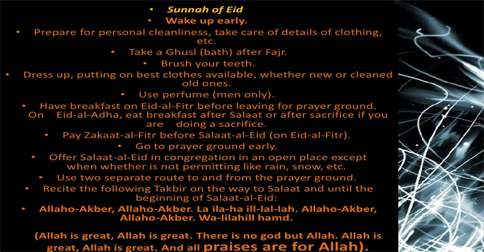.jpg)
Along with the beginning of the month of Ramadan, where Muslims set up how they are going to spend every moment of this Holy month together with the good deeds, prayer as well as worship of Allah Almighty, they also set up a plan on how they are going to celebrate Eid-ul-Fitr that would come at the end of Ramadan.
The Eid-ul-Fitr after Ramadan is one of the most looked-for events among Muslims and Muslims from the entire world make special preparations for this event, because it is a day of spreading and also of sharing joy as well as happiness. The lines below talk over on the Eid-ul-Fitr like a blessing as well as the major duties and obligations a Muslim must undertake and perform relatable to Eid-ul-Fitr.
Eid Obligations Duties
.jpg)
The Blessing:
Also the fact that on the day of Eid there is joy as well as bliss round about, the festival of Eid-ul-Fitr itself is a blessing from Allah Almighty. That’s why, the concept that Muslims celebrate this Eid as an end of Ramadan, in honor of someone or it is something that is fictitious by the later Muslims is totally wrong. Instead it has occurred since the time of Prophet (PBUH) and it is also a blessing of Allah Almighty which He granted upon Muslims.
.jpg)
Duties and Obligations:
Though, Eid-ul-Fitr is an occasion of joy and festival of happiness, but, this joy and happiness does not come along with the usual implications where celebrations are without any limits as well as immediate. Relatively, the celebrations of Eid also come together with the specific constrictions in the form of duties and responsibilities as well. These duties and responsibilities come in the form of Sunnah of Prophet Muhammad (PBUH) and also those things that He used to do on the day of Eid. Given below are some major duties relating to Eid-ul-Fitr.
.jpg)
Offering Eid Prayer:
The first and the foremost responsibility relating to Eid-ul-Fitr is the offering of Eid prayer. Eid being an occasion of celebration does not means that on that day a Muslim can forget Allah Almighty and also indulge in untainted pleasures and enjoying. Instead, praying to Allah on the day of Eid means that the Muslim understands and also apprehends the fact that all the joy and pleasure in his life is a blessing of Allah Almighty on him and He needs to be thanked for it.
.jpg)
Sadqah-tul-Fitr:
Islam is a religion that pays its great attention on giving charity. The stress on charity upsurges even more when there is the requirement of making joy and also happiness available from it to the less prosperous ones. The celebration of Eid-ul-Fitr is the perfect occasion when being benevolent can lead to others being happy and pleased as well. So for this reason, Islam gives the concept of Sadqah-tul-Fitr, which is charities giving that has to be offered before the offering of Eid-ul-Fitr prayer. The perfect time for offering the Sadqah is between the Fajr and Eid-ul-Fitr prayer. Though, the Sadaqah can also be given during the month of Ramadan and hence the less privileged can have time to purchase essential things with which they can celebrate their Eid in a good way.

General Sunnahs of Eid-ul-Fitr:
We all know that, for a Muslim the Sunnah of Prophet Muhammad (PBUH) is the best example and every one desires to copy Him as much as possible. Relating to Eid-ul-Fitr, above and beyond the prayer of Eid and the Sadqah Fitr, there are other basics of Sunnah of Prophet (PBUH) exact for that day. Some common Sunnahs, which a Muslim must try to perceive during Eid day, are given below:
1. The very first Sunnah is of waking up early in the morning. Eid day does not mean that a Muslim is free from the necessary prayer of Fajr, instead on the day of Eid as well a Muslim must wake up at the time of Fajr and offer the Fajr prayer at exact time.
2. After offering Fajr prayer one should prepare the dress as well as the other wearable things that are to be worn when going to perform Eid prayer. Thus, the things required to be ready when a person goes for a bath.
3. Taking bath on the day of Eid before wearing new clothes is also a Sunnah of Prophet Muhammad (PBUH) and a Muslim must also make sure that before wearing on new or clean clothes he is also clean in physically respect as well.
4. If the clothes are new then it’s very good but if new are not available then one must wear the best clothes and after those best clothes one must apply perfume to certify that one is best prepared for the Eid prayer.
5. It is also a Sunnah that before going for offering the Eid prayer, a Muslim eats supper or anything that is available in the house at that time.
6. Offering the Eid-ul-Fitr prayer along with the gathering is also a Sunnah. That’s why, if there are any awful situations, other than that a Muslim must offer the Eid prayer along with the gathering.
7. Relating to Eid-ul-fitr another Sunnah of Prophet (PBUH) was that He would go to the mosque from one way and come back to the home from another way so that He could meet and greet as much people as possible on the day of Eid-ul-Fitr.

Verdict:
In a husk, Eid-ul-Fitr requires no introduction and it is undoubtedly an occasion particular for happiness and joy all around. Though, in celebrations a Muslim must not forget that these festivities required to be thanked and in celebrations one also wishes to make the less privileged a part of it and hence they could also celebrate Eid and the spirit of this blessing is revitalized.








.gif)


































